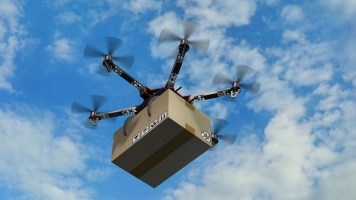OPPORTUNITY
Supply chains can be complex and often involve the management of a vast range of activities. Automatizing operations, ensuring the safe and secure transport of goods, and adopting environmentally friendly processes are becoming increasingly important in supply chain management, while new technologies like delivery drones, autonomous ground robots, and connected machinery offer exciting new ways for supply chains to be optimised.
Nevertheless, some sectors still face significant challenges: short shipping times demanded by customers put huge pressure on retailers to solve the last mile problem, getting fresh and perishable goods rapidly into stores remains a key target to maximise shelf life and reduce waste, and consumers are demanding transparency about product sources. Natural disasters and political instability can significantly disrupt the sourcing and transportation of goods, while other regions face challenges because they are remote, lack infrastructure, or are missing important data.
The aim of this kick-start opportunity is to investigate new services, which use space assets to enhance supply chain management.
TOPICS OF RELEVANCE
Supply chains are integral to many different sectors and there is huge potential for a variety of different applications. Some relevant topics are listed below, with examples of potential applications.
Smart shipping
- Development of unmanned ground, airborne or maritime/fluvial cargo delivery in urban and remote areas.
- Use of new technologies, such as Artificial Intelligence (AI), Internet of Things and blockchain, to optimise shipping resources and reduce time delivery and costs.
Green shipping
- Operational energy efficiency improvement, emissions reduction and transition to electric vehicles and semi-automated driving technology. Connected and semi-automated vehicles, truck platooning and AI or Machine Learning (ML) enabled vehicles tracking and tracing for route optimisation can contribute significantly to these objectives.
- Development of enhanced and efficient carbon footprint measurement and reporting to foster eco-labelling scheme deployment and enforcement.
Safe shipping
- Use of goods’ unique identifiers, sensing technologies and IoT for real-time goods tracking and tracing.
- Use of distributed ledger technology (i.e. blockchain) for efficiently tracking, aggregating and sharing supply-chain data among the involved stakeholders.
- Development of U-Space services and systems in support to the development of airborne drone (cargo) delivery. U-Space services are aimed at allowing safe, efficient and secure access to airspace for large numbers of drones.
Humanitarian shipping
- Use of tracing technologies to enhance the safety and security of goods (from the private and humanitarian sectors) for transport in areas at risks as well as for preventing fraud.
- Use of drones in hard-to-reach rural communities for low-cost and fast delivery of medical supplies, commercial goods, emergency aid, etc.
- Setting-up of remote training tools to promote utilisation of ICT on all aspects of supply chain management.
Supply chain insights
- Use of satellite imagery and complementary data sources to provide unique, timely insights on operations for traders and market analysts.
VALUE OF SPACE
Space-based assets can play a key role in the development of new supply chain services, as described below, and are key for the proposed Kick-Start activity.

Satellite Positioning, Navigation and Timing are key to provide an accurate positioning to track & trace vehicles and goods, navigate automated vehicles, optimise route and operate traffic management systems.
Satellite Earth Observation imagery can be used to provide the maps required by the traffic management, as well as evaluate the conditions on the ground, provide meteorological information, and provide key data for monitoring and forecasting air pollution and CO2 emissions. Satellite imagery can also provide intelligence on operations at locations of interest.
Satellite Communications can play a key role both for regular supply chain operations and in emergencies. They indeed provide a means to communicate with the coordinating centre to and from remote locations where there is no terrestrial network. In case of network failures or cyber-attacks targeting terrestrial communication, SatCom may also be used to increase the supply chain network robustness and resilience. They can finally provide robust communication links for autonomous and remotely piloted vehicles in beyond radio line of sight conditions or if the terrestrial network is not available.
WHAT ARE WE LOOKING FOR?
Kick-Start Activities expand on the business opportunity and technical viability of new services that use one or more space assets, like Satellite Communications, Satellite Navigation, and Earth Observation. This call for Kick-Start Activities is dedicated to the theme "Smart Supply Chain", which means that the call is open to companies that intend to develop space-enabled applications and services to enhance supply chain management.
HOW TO APPLY
1. Register by completing the online questionnaire on ESA-STAR Registration (this provides for the minimum ‘light registration’)
2. Download the official tender documentation (Invitation to Tender) and create a ‘Bidder Restricted Area’ via EMITS from the 15th April 2020.
3. Write your proposal and obtain a Letter of Support from your National Delegation, if needed (see Authorisation of Funding section below).
4. Submit your proposal via ESA-STAR Tendering by 27 May 2020 13:00hr CET.
FUNDING
ESA Space Solutions can provide funding to perform Kick-start activities to any company (economic operator) residing in the following Member States : Austria, Belgium, Czech Republic, Denmark, Estonia, Finland, France, Germany, Greece, Hungary, Ireland, Italy, Luxembourg, the Netherlands, Norway, Poland, Portugal, Romania, Spain, Sweden, and the United Kingdom
Applicants must inform the National Delegation of the country they are residing in to obtain a letter of authorisation allowing the funding of the proposed activity. Contact details of each national delegate can be found here: https://business.esa.int/national-delegations
Kick-Start Activities are funded at:
- · 80% by the European Space Agency for a maximum of €64K per contract for SMEs*
- · 75% by the European Space Agency for a maximum of €60K per contract for non-SMEs
*SMEs, or “Small and Medium enterprises”, are defined here: EU recommendation 2003/361.
WEBINARS
01/04/2020, 15:00 CEST - Smart Supply Chain



